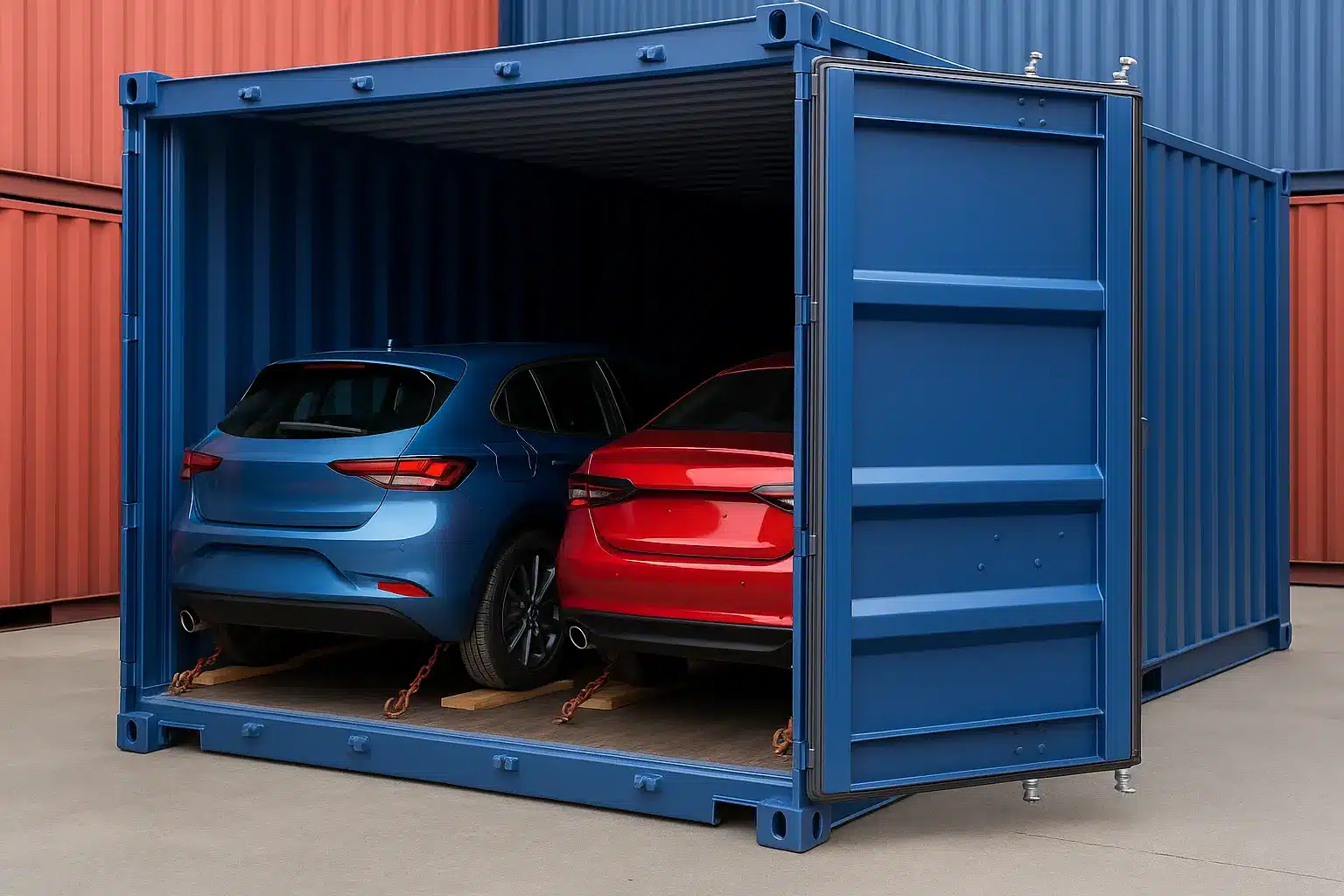Are you planning to ship a car to Japan and looking for reliable auto transport to Japan, secure RoRo car shipping to Japan, or enclosed car shipping to Japan for your vehicle? Planning to ship a car to Japan and looking for reliable auto transport to Japan, secure RoRo car shipping to Japan, or enclosed car shipping to Japan for your vehicle? If so, All TransportDepot Inc., a fully licensed FMC NVOCC (License #021693), manages the entire process to ship your vehicle to Japan from the USA with precision, compliance, and peace of mind. As a result, we transport your car securely, efficiently, and on schedule from start to finish.
In general, the cost to ship a car to Japan ranges from $1,900 to $3,800. However, final pricing depends on several key factors, including vehicle size, shipping method, and the U.S. port of departure. Whether you are importing a personal vehicle, relocating overseas, or shipping multiple units for resale, we provide transparent pricing, reliable sailing schedules, and expert support at every stage.
Ready to move forward?
👉 Place your order: https://alltransportdepot.com/place-order/
📞 +1 (678) 528-5794
📧 ship@alltransportdepot.com
FMC Licensed & Bonded NVOCC | Global Shipping Experts
Moreover, we specialize in vehicle shipping to Japan, offering both RoRo (Roll-On/Roll-Off) and container shipping services from major U.S. ports. With strong carrier partnerships, experienced export coordination, and proven international routes, shipping your car to Japan becomes straightforward, efficient, and stress-free.
💲 Car Shipping Costs & Rates
👉 Place Your Order:
https://alltransportdepot.com/place-order/
📞 Call: +1 (678) 528-5794
📧 Email: ship@alltransportdepot.com
All TransportDepot Inc.
FMC Licensed & Bonded NVOCC #021693
⚓ Ports in Japan
To ensure efficient customs clearance and smooth inland delivery, we ship vehicles through Japan’s primary international ports. As a result, shipments move through customs faster and reach their final destination without unnecessary delays. To support this process, we carefully route vehicles through Japan’s most reliable and well-equipped seaports.
Major Vehicle Import Ports in Japan
-
Port of Yokohama
First and foremost, the Port of Yokohama ranks among Japan’s busiest ports and serves as a primary gateway for imported vehicles. It supports both RoRo (Roll-On/Roll-Off) and container shipping, while offering advanced customs facilities and excellent inland transport connections.
👉 https://www.portyokohama.jp/ -
Port of Kobe
Additionally, the Port of Kobe plays a key role in serving western Japan, particularly for RoRo vehicle imports. Thanks to its strong infrastructure and efficient port operations, it remains a preferred option for vehicles destined for the Kansai region.
👉 https://www.kobeport.jp/ -
Port of Nagoya
Moreover, the Port of Nagoya frequently handles containerized vehicle shipments and supports regional distribution across central Japan. Depending on routing and final delivery location, this port can help optimize overall logistics efficiency.
👉 https://www.port-of-nagoya.jp/
Ultimately, our logistics team selects the most suitable Japanese port based on routing efficiency, vessel availability, total landed cost, and final delivery location. In doing so, we ensure your vehicle arrives in Japan securely, compliantly, and right on schedule.
📑 Documents
Shipping a car requires essential documents such as the original title, identification, and purchase invoice. Our team assists you in preparing all necessary paperwork to ensure smooth processing at the port.- Original vehicle title
- Government-issued ID
- Bill of sale/purchase invoice
📑 Vehicle Import Requirements
Japan enforces clear but highly detailed vehicle import and registration regulations. Therefore, proper preparation plays a critical role in avoiding delays, rejections, or unexpected costs. To support a smooth process, our team actively guides you through every requirement, ensuring all documentation is complete and compliant before shipment.
Key Vehicle Import & Registration Rules in Japan
-
Vehicles must comply with Japanese safety and emission standards before authorities approve registration
-
Right-hand-drive vehicles are standard and required for road registration in Japan
-
Import duty is generally low; however, Japanese consumption tax applies based on CIF value (Cost, Insurance, and Freight)
-
Vehicles must pass Japanese inspection and compliance testing after arrival, which may include modifications
-
A licensed Japanese customs broker must complete customs clearance at the port of entry
-
Importers must present the original title, bill of lading, and export documents for release
Moreover, preparing documentation accurately before shipment helps prevent delays during inspection and registration. Consequently, our logistics specialists coordinate closely with brokers and inspectors to ensure your vehicle clears customs efficiently, legally, and without unnecessary complications.
🧰 How to Prepare Your Car
Preparing your car includes a simple checklist: remove personal items, reduce fuel levels, and document the vehicle’s condition. Following these steps helps avoid delays and ensures your car is ready for safe loading and transport.- Remove personal belongings (shipping of cars excludes personal effects unless in a container)
- Leave less than ¼ fuel tank
- Provide export docs
- Inspect and photograph the vehicle
✅ Why Choose All TransportDepot?
When you ship car with All TransportDepot, you benefit from:
-
FMC Licensed & Bonded NVOCC (#021693)
-
20+ years of international car shipping experience
-
Nationwide U.S. pickup from all major cities
-
Affordable, competitive rates with no hidden fees
-
Full insurance options for peace of mind
-
Expert support with documentation and customs compliance
👉 We ensure your vehicle arrives safely and on schedule.
👉 Get a Free Quote | 👉 Book Your Shipment
Shipping an Electric Car from the USA
❓ Frequently Asked Questions
How Much Does It Cost to Ship a Car to Japan from the USA?
In general, shipping a car to Japan costs between $1,900 and $3,800. However, the final price varies based on several important factors. Specifically, vehicle size, shipping method (RoRo or container), U.S. departure port, and current ocean freight rates all influence the total cost. Additionally, Japanese taxes and registration fees are calculated separately and are not included in ocean freight pricing.
For the most accurate pricing, use our Car Shipping Rate Calculator or request a personalized quote tailored to your vehicle and routing.
What Is the Cheapest Way to Ship a Vehicle to Japan?
We are usually asked if one should consider RoRo car shipping to Japan. Typically, RoRo (Roll-on/Roll-off) shipping provides the most economical solution for operational vehicles. However, many customers still choose container shipping when they want extra protection or must meet specific import requirements.
How Long Does It Take to Ship a Car to Japan?
On average, transit time from the United States to Japan ranges from 3 to 5 weeks. However, additional time may be required for customs clearance, vehicle inspection, and compliance testing after arrival. Therefore, planning ahead helps keep timelines predictable.
What Are Japan’s Vehicle Import Rules?
Before shipping, it’s essential to understand Japan’s import requirements. Key rules include:
-
Compliance with Japanese safety and emission standards
-
Payment of consumption tax based on CIF value (Cost, Insurance, and Freight)
-
Customs clearance completed through a licensed customs broker
-
Vehicle inspection and registration required before road use
By understanding these requirements in advance, you can avoid delays, rework, and unexpected costs.
Should I Choose RoRo or Container Shipping? Enclosed Car Shipping to Japan
When comparing shipping options, RoRo shipping delivers the lowest cost and works best for running vehicles.
On the other hand, container shipping offers added security and remains ideal for high-value, non-running, or damaged vehicles. We offer enclosed car shipping to Japan for luxury cars or at owners’ request.
Ultimately, when it comes to auto transport to Japan, our team evaluates your vehicle and budget to help you choose the safest and most cost-effective option.
Can You Ship Non-Running Vehicles to Japan?
Yes. When vehicles do not run or require additional care, we ship them using container services. Moreover, special loading equipment is used when necessary to ensure safe handling. Depending on vehicle condition, additional handling fees may apply.
How Is Shipping Cost to Japan Calculated?
Shipping rates are calculated based on several key factors, including:
-
Vehicle size and weight
-
Selected shipping method (RoRo or container)
-
U.S. port of departure
-
Destination port in Japan
-
Current ocean freight rates
-
Optional services such as inland pickup and special handling
As a result, our pricing system delivers accurate, up-to-date estimates based on real market conditions.
Do You Handle Bulk or Dealer Vehicle Shipments to Japan?
Yes. We work closely with auto dealers, exporters, collectors, and individuals shipping multiple vehicles to Japan. Accordingly, we offer bulk discounts, streamlined documentation, and reliable shipment tracking for larger or repeat shipments.
Do You Assist With Vehicle Sourcing in the USA?
Yes. To simplify the process further, we assist international buyers with:
-
Vehicle sourcing
-
Auction access
-
Pre-purchase inspections
-
Export documentation
-
End-to-end shipping coordination
Consequently, customers shipping vehicles to Japan can manage the entire process confidently and efficiently.
How Do I Get a Free Quote for Shipping a Car to Japan?
To get started, request a free instant quote using our online calculator or contact our team directly. Once you provide your vehicle details—year, make, model, pickup location, and destination port—we’ll send you a complete cost breakdown along with an estimated transit timeline.
2025’s Most Popular Imported Vehicles: Top Models
🚢 Ship with Confidence. Partner with world-renowned NVOCCs and leading global ocean carriers.
👉 Get a Rate: https://alltransportdepot.com/roro-shipping-cost/ 👉 Place Your Order: https://alltransportdepot.com/place-order/ 📲 WhatsApp: +1 (470) 791-4497a 📞 Call: +1 (678) 528-5794 📧 Email: ship@alltransportdepot.com All TransportDepot Inc. FMC Licensed & Bonded NVOCC #021693

Jessica is a dedicated customer service representative at Windy City Car Carriers. Her warm and friendly demeanor puts customers at ease as she guides them through the car shipping process. She takes pride in ensuring a stress-free experience for every client.



